牛津英语上海版7A
最新上海市牛津英语7A
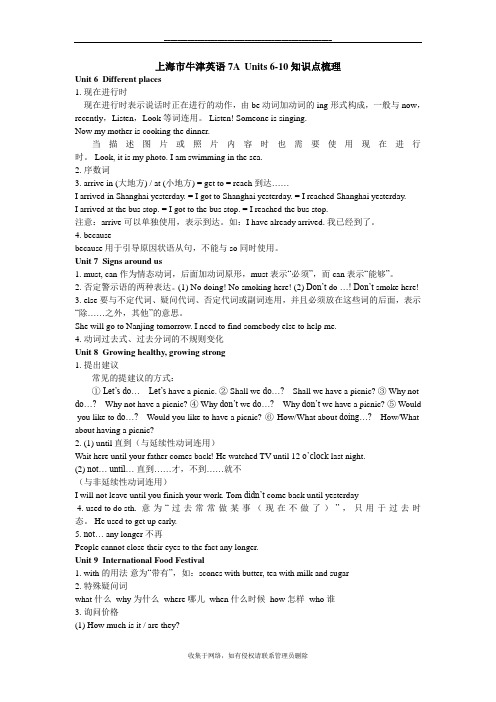
上海市牛津英语7A Units 6-10知识点梳理Unit 6 Different places1. 现在进行时现在进行时表示说话时正在进行的动作,由be动词加动词的ing形式构成,一般与now,recently,Listen,Look等词连用。
Listen! Someone is singing.Now my mother is cooking the dinner.当描述图片或照片内容时也需要使用现在进行时。
Look, it is my photo. I am swimming in the sea.2. 序数词3. arrive in (大地方) / at (小地方) = get to = reach 到达……I arrived in Shanghai yesterday. = I got to Shanghai yesterday. = I reached Shanghai yesterday.I arrived at the bus stop. = I got to the bus stop. = I reached the bus stop.注意:arrive可以单独使用,表示到达。
如:I have already arrived. 我已经到了。
4. becausebecause用于引导原因状语从句,不能与so同时使用。
Unit 7 Signs around us1. must, can作为情态动词,后面加动词原形,must表示“必须”,而can表示“能够”。
2. 否定警示语的两种表达。
(1) No doing! No smoking here! (2) Don’t do …!Don’t smoke here!3. else要与不定代词、疑问代词、否定代词或副词连用,并且必须放在这些词的后面,表示“除……之外,其他”的意思。
She will go to Nanjing tomorrow. I need to find somebody else to help me.4. 动词过去式、过去分词的不规则变化Unit 8 Growing healthy, growing strong1. 提出建议常见的提建议的方式:①Let’s do…Let’s have a picnic. ② Shall we do…? Shall we have a picnic? ③ Why not do…? Why not have a picnic? ④ Why don’t we do…? Why don’t we have a picnic? ⑤ Would you like to do…? Would you like to have a picnic? ⑥ How/What about doing…? How/What about having a picnic?2. (1) until 直到(与延续性动词连用)Wait here until your father comes back! He watched TV until 12 o’clock last night.(2) not…until…直到……才,不到……就不(与非延续性动词连用)I will not leave until you finish your work. Tom didn’t come back until yesterday4. used to do sth. 意为“过去常常做某事(现在不做了)”,只用于过去时态。
七年级英语7A Unit1-Unit5主要知识点复习上海牛津版知识精讲

七年级英语7A Unit1-Unit5主要知识点复习上海牛津版【本讲教育信息】一、教学内容:7A Unit1-Unit5主要知识点复习二、知识总结与归纳Module 1 (Unit 1- Unit 3)1. invite sb. to do邀请某人做某事He has invited us to stay with his family in Beijing.他已经邀请我们去北京和他的家人呆在一起。
2. travel to 旅行去……We usually travel to some small cities.我们经常去一些小城市旅游。
3. more interesting 更加有趣more beautiful 更加美丽more exciting 更加激动人心4. talk to 和……谈话Let’s talk to Mum and Kitty.让我们去和妈妈还有基蒂谈谈。
5. travel agent 旅行经纪人I’ll get some brochures from the travel agent.我会从旅行经纪人那里拿到一些宣传手册。
6. How long does it take to…? ……花费多少时间?It takes (time) to do ………花费(时间)How long does it take to get to Beijing?到北京花费多少时间?It takes about 2 and a half hours to get there.到北京大概要花费两个半小时。
7. come back 回来We’re going to come back at 8.我们将会在8点回来。
8. at the end of (August) 在(八月)底We will start school at the end of August.我们将会在八月底开学。
9. thank sb. for 为……谢某人Thank you for your water. 谢谢你的水。
上海牛津英语7a教案
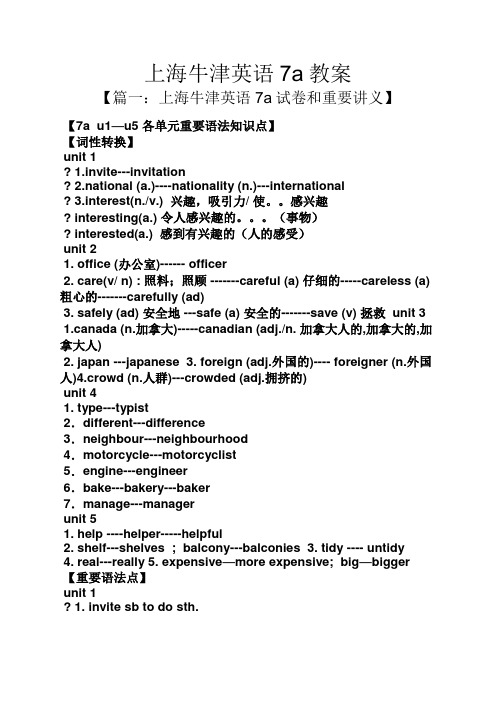
上海牛津英语7a教案【篇一:上海牛津英语7a试卷和重要讲义】【7a u1—u5 各单元重要语法知识点】【词性转换】unit 1? 1.invite---invitation? 2.national (a.)----nationality (n.)---international? 3.interest(n./v.) 兴趣,吸引力/ 使。
感兴趣? interesting(a.) 令人感兴趣的。
(事物)? interested(a.) 感到有兴趣的(人的感受)unit 21. office (办公室)------ officer2. care(v/ n) : 照料;照顾 -------careful (a) 仔细的-----careless (a) 粗心的-------carefully (ad)3. safely (ad) 安全地 ---safe (a) 安全的-------save (v) 拯救 unit 3 1.canada (n.加拿大)-----canadian (adj./n. 加拿大人的,加拿大的,加拿大人)2. japan ---japanese3. foreign (adj.外国的)---- foreigner (n.外国人)4.crowd (n.人群)---crowded (adj.拥挤的)unit 41. type---typist2.different---difference3.neighbour---neighbourhood4.motorcycle---motorcyclist5.engine---engineer6.bake---bakery---baker7.manage---managerunit 51. help ----helper-----helpful2. shelf---shelves ; balcony---balconies3. tidy ---- untidy4. real---really5. expensive—more expensive; big—bigger 【重要语法点】unit 1? 1. invite sb to do sth.? 2. talk to/ with sb. ? 4. talk about sth. (talk to sb about sth) ? 3. on+具体几月几日,on aug.16/ on 16 august 注意读音 ? 4. thank you for+ n.----thank you for your help. thank youfor+ doing---- thank you for writing to me. ? 5. more than = over 超过? 6. the summer palace; the great wall ; the palace museum ? tian’anmen square; yu garden7. see sb doing sth.与 see sb do sth 之间的区别? 8. it takes me 2 hours to finish my homework.?how long does it take you to finish your homework?9. 现在完成时态简单介入:例如: they ha ven’t been to the usa before.i haven’t finished my homework yet.she has already cleaned the classroom.10. another例如:this book is too difficult for me. will you please give me another one?unit 21. have no food or water 在否定句中and应改为“or”2. take sb to somewhere 带某人去某地3. take care of = care for = look after 照顾,照看4. buy sb sth = buy sth for sb 为某人买某物5. save animals from danger 把动物从危险中解救出来6. promise to do 承诺做某事7. 一般过去时态介入8. 名词+ to do,to do 用来补充说明用途例如:give him some water to drink;give him a blanket to keep warm;give it a basket to sleep inunit 31. six million 注意数字表达法:例如:2,700,560 two million seven hundred thousand five hundred and sixty2. 注意国家名称和国籍的区别。
牛津上海版英语7A讲解材料
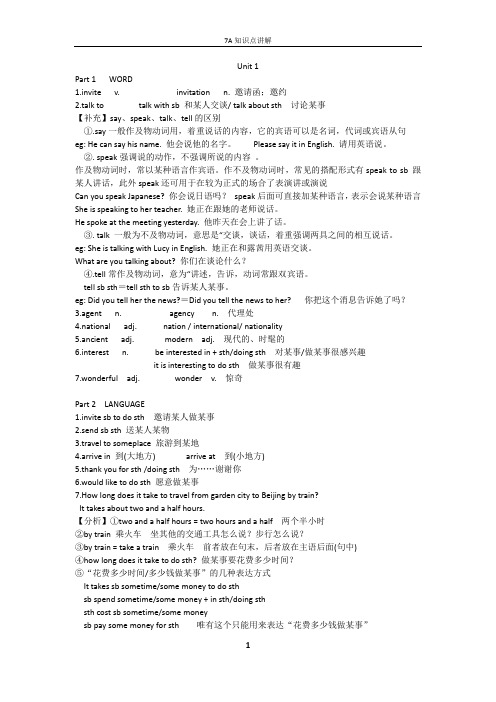
Unit 1Part 1 WORD1.invite v. invitation n. 邀请函;邀约2.talk to talk with sb 和某人交谈/ talk about sth 讨论某事【补充】say、speak、talk、tell的区别①.say一般作及物动词用,着重说话的内容,它的宾语可以是名词,代词或宾语从句eg: He can say his name. 他会说他的名字。
Please say it in English. 请用英语说。
②. speak强调说的动作,不强调所说的内容。
作及物动词时,常以某种语言作宾语。
作不及物动词时,常见的搭配形式有speak to sb 跟某人讲话,此外speak还可用于在较为正式的场合了表演讲或演说Can you speak Japanese? 你会说日语吗?speak后面可直接加某种语言,表示会说某种语言She is speaking to her teacher. 她正在跟她的老师说话。
He spoke at the meeting yesterday. 他昨天在会上讲了话。
③. talk 一般为不及物动词,意思是“交谈,谈话,着重强调两具之间的相互说话。
eg: She is talking with Lucy in English. 她正在和露茜用英语交谈。
What are you talking about? 你们在谈论什么?④.tell常作及物动词,意为“讲述,告诉,动词常跟双宾语。
tell sb sth=tell sth to sb告诉某人某事。
eg: Did you tell her the news?=Did you tell the news to her? 你把这个消息告诉她了吗?3.agent n. agency n. 代理处4.national adj. nation / international/ nationality5.ancient adj. modern adj. 现代的、时髦的6.interest n. be interested in + sth/doing sth 对某事/做某事很感兴趣it is interesting to do sth 做某事很有趣7.wonderful adj. wonder v. 惊奇Part 2 LANGUAGE1.invite sb to do sth 邀请某人做某事2.send sb sth 送某人某物3.travel to someplace 旅游到某地4.arrive in 到(大地方) arrive at 到(小地方)5.thank you for sth /doing sth 为……谢谢你6.would like to do sth 愿意做某事7.How long does it take to travel from garden city to Beijing by train?It takes about two and a half hours.【分析】①two and a half hours = two hours and a half 两个半小时②by train 乘火车坐其他的交通工具怎么说?步行怎么说?③by train = take a train 乘火车前者放在句末,后者放在主语后面(句中)④how long does it take to do sth? 做某事要花费多少时间?⑤“花费多少时间/多少钱做某事”的几种表达方式It takes sb sometime/some money to do sthsb spend sometime/some money + in sth/doing sthsth cost sb sometime/some moneysb pay some money for sth 唯有这个只能用来表达“花费多少钱做某事”8.表示方位的短语和例句It is in the north-west of BeijingIt is in the center of BeijingIt is north of Beijing9.现在完成时/一般将来时Unit 2Part 1 WORD1.officer n. office n. 办公室/ official adj. 官方的2.society n. social adj. 社会的3.safely adv. safe adj. 安全的/ safety n. 安全4.hunt n. hunter n. 猎人5.visit v. 参观visitor n. 观光者6.unkind adj. kind adj. 友善的Part 2 LANGUAGE1.照顾、照看take care of / look after2.Do you know what the SPCA is? 划线部分不是特殊疑问句,而是从句,所以what后面不用把is提前3.I found them and took them to the SPCA. 用and连接时,前后的时态要一致,如句中的found和took,都是一般过去时4.promise to do sth 答应做某事5.need + sth / to do sth 需要某物/ 需要做某事6.祈使句Unit 3Part 1 WORD1.foreigner n. foreign adj. 外国的2.male adj. female adj. 女性的3.example for example 例如Part 2 LANGUAGE1.live in someplace 住在某地2.far away from / near 远离/靠近eg: It is far away from China. It is near China.3.favourite = like …… bestMy favourite sport is basketball. = I like basketball best.4.There are more than twenty-eight thousand people from Canada in Garden City.【分析】①more than 超过,多于②twenty-eight thousand 两万八千two hundred thousand 二十万thousands of 成千上万的(只有这种情况下,thousand后面才可以加s)“百”,“百万”怎么表达?5.各国国名及各国人的表达方式,如:china 中国,chinese 中国人Unit 4Part 1 WORD1.architect n. architecture n. 建筑学、建筑式样2.construction n. construct v. 建造build的名词形式?3.removal n. move v. 移动4.manager n. manage v. 管理5.broken adj. break v. 打破6.engine n. engineer n. 工程师7.总结身体词汇,如:arm 手臂8.各种职业的表达方式Part 2 LANGUAGE1.take photographs 拍照photograph = photo 照片【回顾】“黑人英雄吃番茄土豆”其复数为后面加es2.一般过去时Unit 5Part 1 WORD1.choose v. choice n. 选择2.tidy adj. untidy adj. 不整洁的3.different adj. difference n.Part 2 LANGUAGE1.My bedroom is too small for all my things. 我的房间太小,不够放我的所有东西2.put it near my bedroom.Put the plant next to it.Put it opposite the sofa.Put it on the floor.Put it on the floor between the TV set and the sofa.Put it on the rug in front of the sofa.注意以上几个方位词的意思和用法3.形容词比较级和最高级Unit 6Part 1 WORD1.peace n. peaceful adj. 和平的2.neighbour n. 邻居neighbourhood n. 邻近;周围;邻居关系;附近一带3.noisy adj. noise n. 噪音4.relaxing adj. relax v. 放松5.pleasant adj. please v. 请,使高兴Unit 7Part 1 WORD1.direction n. direct adj. 直接的2.silence n. silent adj. 安静的3.luck n. lucky / unlucky / luckilyrmation 不可数名词Part 2 LANGUAGE【补充】情态动词情态动词是一种本身有一定的词义,表示说话人的情绪、态度或语气的动词,但不能单独作谓语,只能和其他动词原形构成谓语。
上海牛津英语7AU1--U4的知识点和练习
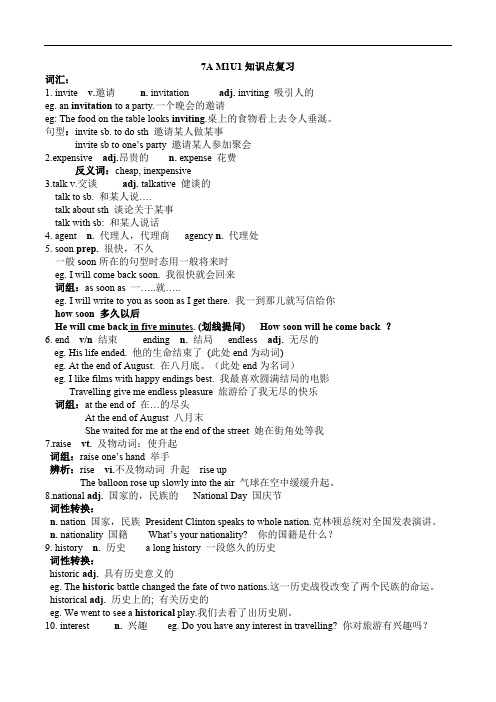
7A M1U1知识点复习词汇:1. invite v.邀请n. invitation adj. inviting 吸引人的eg. an invitation to a party.一个晚会的邀请eg: The food on the table looks inviting.桌上的食物看上去令人垂涎。
句型:invite sb. to do sth 邀请某人做某事invite sb to one’s party 邀请某人参加聚会2.expensive adj.昂贵的n. expense 花费反义词:cheap, inexpensive3.talk v.交谈adj. talkative 健谈的talk to sb. 和某人说….talk about sth 谈论关于某事talk with sb: 和某人说话4. agent n. 代理人,代理商agency n. 代理处5. soon prep. 很快,不久一般soon所在的句型时态用一般将来时eg. I will come back soon. 我很快就会回来词组:as soon as 一…..就…..eg. I will write to you as soon as I get there. 我一到那儿就写信给你how soon 多久以后He will cme back in five minutes. (划线提问) How soon will he come back ?6. end v/n结束ending n. 结局endless adj.无尽的eg. His life ended. 他的生命结束了(此处end为动词)eg. At the end of August. 在八月底。
(此处end为名词)eg. I like films with happy endings best. 我最喜欢圆满结局的电影Travelling give me endless pleasure 旅游给了我无尽的快乐词组:at the end of 在…的尽头At the end of August 八月末She waited for me at the end of the street 她在街角处等我7.raise vt. 及物动词:使升起词组:raise one’s hand 举手辨析:rise vi.不及物动词升起rise upThe balloon rose up slowly into the air 气球在空中缓缓升起。
上海牛津英语七上7A单词表
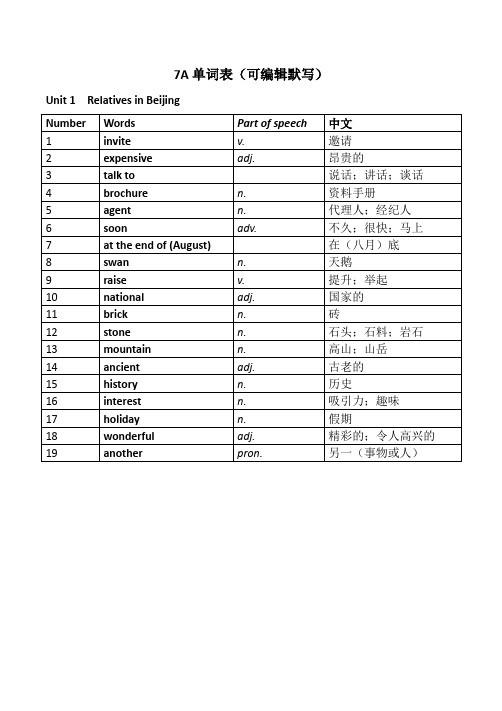
prevention
n.
预防;防止;防范
4
cruelty
n.
残酷
5
someone
pron.
某人
6
puppy
n.
小狗;幼犬
7
thirsty
adj.
口渴的
8
lovely
adj.
可爱的;有吸引力的
9
as
prep.
作为;当作
10
prefer
v.
更喜欢
11
care
n.
照料;照顾
12
take care of
照看;照料;照顾
上一个的
10
crisp
n.
炸薯片
11
bar
n.
条;块
12
lemonade
n.
柠檬味汽水
13
used to
modal v.
过去常常
14
not ... any longer
不再
Unit 9 International Food Festival
Number
Words
Part of speech
中文
1
homeless
25
engine
n.
发动机;引擎
26
fire engine
n.
消防车;救火车
27
scene
n.
现场;地点
28
carry
v.
搬;扛;抱;运送
Unit 5 Choosing a new flat
Number
Words
Part of speech
中文
1
牛津英语沪教版7A,Unit4知识归纳
牛津英语沪教版7A,Unit4知识归纳课题:七年级上Unit4知识梳理与巩固教学目标:1 词汇:company ,removal ,meeting ,hurt ,broken ,carrytake notes ,knock down ,catch fire ,both …and …,run away ,fire engine2 语法:一般现在时(职业的表达及常用句型);一般过去时;see sb doing 看见某人正在做…教学重点、难点:1 . Words and vocabulary2. 一般过去时3. 辨析:see sb doing 和see sb do教学过程:一词汇梳理1. meeting ['mi:ti?] n. 会议【词性转换】 meet [mi:t] v. 遇见;会见;见到Mr White isn’t here; he’s at a meeting. 怀特先生不在这儿,他在开会2. manager ['m?nid??] n. 经理【词性转换】manage ['m?nid?] v. 管理;经营management ['m?nid?m?nt] n. 管理;管理学Our manager is very strict with us. 我们的经理对我们要求很严格。
3. take notes 记笔记Please take notes of the important words while you read.请边读边把重要的单词记下来。
4. knock down 撞倒She was knocked down by a bus. 她被公共汽车撞倒了。
5 catch fire 着火His house caught fire last night. 昨晚他家失火了。
6. both...and... ……两者都【提示】 both...and...连接的两个成分须在形式、时态、词性等方面完全一致。
上海牛津英语7A-Unit4、5知识点及语法重点
教学内容:7A Unit4、5知识点及语法重点(现在完成时)教学重点:三种时态的训练和巩固教学难点:现在完成时—瞬间动词与延续性动词的转换教学过程:1、课文知识点讲解2、时态练习3、练习巩固4、家庭作业1. 用there be句型表示客观存在(就近原则)2.现在完成时(一)含义现在完成时用来表示现在之前已发生或完成的动作或状态,但其结果却和现在有联系, 也就是说, 动作或状态发生在过去但它的影响现在还存在。
e.g. I have lost my wallet. (含义是:现在我没有钱花了。
)Jane has laid the table.(含义是:已可以吃饭了。
)Michael has been ill.(含义是:现在仍然很虚弱。
)He has returned from abroad. (含义是:现在已在此地)(二)结构助动词have /has+动词过去分词,主语为第三人称单数用has,其他人称用have 。
(三)句型1、肯定句:主语+have /has+动词过去分词+其他。
I have studied English for 5 years .2、否定句:主语+have /has+not +动词过去分词+其他。
We haven’t been there .3、一般疑问句:Have/Has+主语+动词过去分词+其他?Has he eaten that apple ?4、特殊疑问句:特殊疑问词+ have /has +主语+动词过去分词+其他?(四)用法1、现在完成时可以用来表示发生在过去某一时刻的、持续到现在的情况,常与for, since连用。
e.g. Mary has been ill for three days.I have lived here since 1998.2、现在完成时往往同表示不确定的过去时间状语连用, 如already, yet, just, before, recently, lately等:e.g. He has already obtained a scholarship.I haven’t seen much of him re cently (lately).We have seen that film before.Have they found the missing child yet?3、现在完成时常常与表示频度的时间状语连用e.g. Have you ever been to Beijing?I have never heard Bunny say anything against her.I have used this pen only three times. It is still good.George has met that gentleman on several occasions.4、现在完成时还往往可以同包括现在时间在内的时间状语连用,如now, up to these few days/weeks/months/years, this morning/week/month/year, now, just, today, up to present, so far等。
上海版牛津初中英语7A 《OXFORD ENGLISH》课件
s
)
j. The nights start after half past five.
(w )
5:15am—6:30 7:30am— 5:30pm
longer and ________ hotter . Summer days are_________
Winter days _________________________ are shorter and colder. .
OXFORD ENGLISH 7 A
Page 30
日
一
二
三
四
五
六
1
国庆节 ...
2
国际和平...
3
国际住房日
4
世界动物日
5
国际减轻...
6
初四
7
初五
8
全国高血...
early October
9
世界邮政...
辛亥革命...
11
重阳节
12
初十
13
世界保健...
14
世界标准日
15
国际盲人...
mid October
are shorter and hotter. Summer nights _______________________ .
Winter ______________________________ nights are longer and colder. .
I like __________________ summer / winter. .
. Which season do you like best?
Let’s look at this chart.
沪教版牛津英语七年级上册7A知识点整理讲义
P21.invite v.Invitation n. 邀请,邀请函Invite sb. to do sth.邀请某人做某事(不用doing)Invite sb. to sp.邀请某人去某地介词一定用to2.Expensive adj.比较级加more,最高级加the mostExpense n.花费3.talk to 说话,告诉(一个人讲,大家听/主动和他人说话)例:They taught the little boy not to talk to stranger.I talk to my parents about my school.Talk with 和。
交流(大家一起讲)I talk with my parents about our country.Brochure复数加s4.Agent n代理人;经纪人Agency n.代理处是人用agent,不是人用agency,不用管翻译5.同义句:Get a letter from sb.=receive a letter from =hear from收到。
的来信6.Stay with sb. 和某人待在一起,和某人一起住,介词用withStay up 熬夜Stay up late 熬夜Late 晚的,迟到的Late形容词副词同形Lately 最近的7.结构:have/has+动词过去分词Haven’t/hasn’t +动词过去分词一般疑问句:have/has提前标志词:1.in the past+一段时间2.already,yet已经,还没有3.For+一段时间4.So far5.Just(没有now)6.before(放在句末)7.现完+since+一过Since+一过,现完7.before放在句末时,用现完I haven’t seen my cousins before.8.比较级:1.+er:当单词长度小于等于7个(1)以“辅元辅”结尾,双写最后一个辅音+er(2)以“辅音字母+y”结尾,y变ier2.+more:字母个数大于7个9.Get sth. from sb.从某人处得到某物10.Travel agent旅行社代理人Travel agency 旅行社P31.soon 不久看到它就用一将2.at the end of 在。
- 1、下载文档前请自行甄别文档内容的完整性,平台不提供额外的编辑、内容补充、找答案等附加服务。
- 2、"仅部分预览"的文档,不可在线预览部分如存在完整性等问题,可反馈申请退款(可完整预览的文档不适用该条件!)。
- 3、如文档侵犯您的权益,请联系客服反馈,我们会尽快为您处理(人工客服工作时间:9:00-18:30)。
牛津英语上海版7A Unit 2 教学设计Our daily lifePeriod One教学内容:SB 7A page 18,19 ( A1,A2,B1 )教学目标:培养学生的阅读能力,能灵活运用本课所学词汇、句型来表述日常活动。
教学重点:1重点单词:business, discuss, achieve, grade, fail, collect, twice ,violin, continue, attend, club2.重点短语:have breakfast, at breakfast ,once /twice a week , on the way to ,return to, have dinner, wake up ,collect sb from school ,make phone calls, an hour or two, continue working on , wake up, attend a club3.通过阅读文章,填写表格信息,并且复述课文。
教学难点:新单词的拼写与运用及课文的复述。
教学过程:Step 1: Greeting1.Ask the ss some questions:I get up at 6 a.m in the morning.What do you do after you get up ?Do you like playing football? How often?What time do you have super?How do you go to school?Step 2: Pre-readingAsk the ss to look at the pictures of page 19, B1.Tell the ss to think about their daily life and use “every day , twice/One a week, never ,sometimes” ect to ask and answer the questions.Step 3 : While-reading1.Tell the ss they are going to read Cheng Na’s daily life .Ask the ss to skim the article, title, picture and choose the right answers to A1.2.Answer the questions about Cheng Na. Answer them by writing Y or N, Write DK(Don’t know)Step 4 Post –reading ( 15 minutes )Ask the ss to read the whole article carefully and then complete the information about Cheng Na.A day in the life of …Step 5 Check the answers and teach the new words in the blanks. Step 6 listen to the tape and follow the tape.Step 8 HomeworkRead the text and remember the new words.Period 2教学内容: page 18, 20 ( B2, B3 )教学目标:通过听和读的形式,了解一天的日程安排,加深巩固本单元的话题和语言知识学习,培养学生的听说能力。
教学重点:1. listen to the article and complete the table below2. spend 和arrive的用法教学难点: 1. listening and answer the questions 2. 在一般现在时中第三人称单数动词的使用。
Step 1 GreetingStep 2 Revise1)Revise the new words : let the ss read after the teacher and then put these phrases into English:1.吃早餐2.吃早饭的时候3.一周一次4.一周两次5.回家的路上6.回到学校7.穿上校服8.给我妈妈打电话9.从学校接走他的女儿10.忙于做作业2 )Look at the table and retell Cheng Na’s daily life.Step 3 Pre-listenAsk the ss to tell something about their daily life ,the teacher can ask the questions like this :1.Which school are you studying now ?2.What do you usually do after you get up ? Do you clean your teeth and comb your hair?3. What time do you get to /arrive school ?according to the answers we can teach the new words ( junior/ combs/ arrive )Step 4 listeninglisten to the article and complete the table below:Step 5 Post-readingOpen the SB , page 20. Read the article and answer the questions of B3.Step 6 Read aloud the textStep7 practice1. Book B ,page 23 ( B) :Work in pairs and find out how lazy your partner is.2. Ask the ss to add –s or-es to some words:Study wake clean have go get walk play begin spendStep 8 HomeworkBook B (Page 29,A1) 用动词的正确形式填空。
Period 3教学内容:page 21, 22 23 ( Cheng Na’s day)教学目标:让学生通过听力材料的相关信息,判断人物的职业;听一段关于一位中学生日常生活的文字,操练巩固本课话题和语法。
从而培养学生的听力和判断能力,掌握听力技巧。
教学重点:1. l isten to the article and complete the table below2. spend 的用法教学难点: 1. listening and answer the questions 2. 在一般现在时中第三人称单数动词的使用。
教学过程:Step 1 Pre-listeningThe teacher describe their daily lives and their jobs, then ask the ss to guess “ What does the man or the woman do?”1)He works inside most of the time. He sit s at a desk. Sometimes He usesa computer. He is in charge of other people. He also meets clients everyday .2)She works in a small room all day. People come to see me and she looksat their teeth better.Step 2 listening (A1, A2 )1 ) Student will hear six people talking about their daily lives and their jobs. listen carefully and work out which person is talking.2) Listen again and match the words and phrases below to the people in A1Step 3 Listening to B11)listen to the tape twice and answer the 4 questions B12)listen to the tape again and fill in the blanks1.Zhao Xue is the ______ child. (only )2.She always gets up at ______ . (6:30)3.She has ______ at about 7:10.(breakfast )4.She always goes to school by _____. (bus )5.She is______ late for school. (never )Step 4 Reading the article and correct the statements of B2Step 5 Language ( page 23 )Complete the report of Cheng Na’s day by filling the blanksStep 6 HomeworkWrite something about your daily life and give a report tomorrow.Period 4教学内容:Language, page 23 (the simple present tense ), Speaking page 25( A1, A2 )教学目标:通过复习词尾-s的发音: /s/, /z/ , /iz/ ,让学生掌握并巩固名词复数词尾-s及动词第三人称单数词尾-s的准确发音。
教学重点:speaking 和判断词尾的发音教学难点: 词尾的发音教学过程:Step1 pre-speakingUse these sentences to present the speaking.1.Mr Wu makes us work hard . He says it is important.2.He teaches us maths.Step 2 listen and say the words of A1 aloud.Step 3 Speaking up ( A2 )Step 4 LanguageRevise the forms of the present tense: At first, ask the ss to add –s or –es to some words, then make sure the ss understand the rules.go do wash catch study put finish make drive have work write discuss watch hurry mix carryStep 5 Sum up the rules of the present tenseStep 5 PracticeAsk students questions about their daily habits following the model below. Then have ss ask and answer similar questions in pairs. The teacher write down the sentences on the broad.For example:1 ) I brush my teeth every morning. Mary brushes her hair .2) What do you do every morning?3) Does your sister have a bath once a week . ectStep 6 Grammar英语周报:第四期,第二版,阅读并讲解“浅谈一般现在时”的用法。
